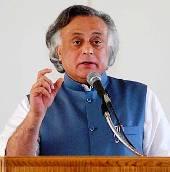 At Copenhagen, attempts to arrive at a fair deal on climate change were deadlocked with countries refusing to budge from their positions on sticky issues like emission cuts.
At Copenhagen, attempts to arrive at a fair deal on climate change were deadlocked with countries refusing to budge from their positions on sticky issues like emission cuts.
Environment minister Jairam Ramesh, who is leading the Indian delegation, said the BASIC group -- comprising India, China, South Africa and Brazil -- 'is united and we would like to reiterate that we want an equitable and fair agreement to emerge out of the summit'.
Here we reproduce Jairam Ramesh's speech -- what can be described as India's final stand at Copenhagen.
Mr President, Excellencies, Ladies & Gentlemen,
It is my privilege to speak on behalf of the Government of India. We continue to derive inspiration from the Father of our nation, Mahatma Gandhi, who is an icon for the environmental movement everywhere.
India is already and will be even more profoundly impacted by climate change. In many ways, we have the highest vulnerability on multiple dimensions. We have a tremendous obligation to our own people by way of both adaptation and mitigation policies and programmes. That is why we have already announced a number of ambitious measures proactively.
We have a detailed national action plan on climate change with eight focused national missions and twenty four critical initiatives. Under this plan, we have already launched a solar energy mission aimed at 20,000 Mw by 2022 and a domestic market-based mechanism for further stimulating energy efficiency in industry.
Other national missions for accelerating afforestation, for promoting sustainable habitats, for expanding sustainable agriculture and for protecting the crucial Himalayan ecosystem are on the anvil. New GHG emission-reducing technologies in coal-based power generation are being deployed on a large-scale. Mandatory fuel efficiency standards in the transport sector will soon become a reality.
We have established our own version of an IPCC comprising more than 120 of our leading scientific and technological institutions to continuously measure, monitor and model the impacts of climate change on different sectors and in different regions of our country.
In addition to establishing a nation-wide climate observatory network, we are going to launch our own satellite in 2011 to monitor GHG and aerosol emissions globally.
Derived from our detailed National Action Plan on Climate Change, we are now considering nationally accountable mitigation outcomes in different sectors like industry, energy, transport, building and forests.
Over the last decade we have added over 3 million hectares to our forest cover and today our forest cover is sequestering close to 10 per cent of our annual greenhouse gas emissions. We will endeavour to maintain that level.
India has been a major participant in the CDM. If all our projects are approved and implemented as scheduled by 2012, carbon credits amounting to a further 10 per cent of our annual GHG emissions will be available to developed countries to enable them to meet their KP commitments.
We are convinced that a low-carbon strategy is an essential aspect of sustainable development. While we already have one of the lowest emissions intensity of the economy, we will do more.
We are targeting a further emissions intensity decline of 20-25 per cent by 2020 on 2005 levels. This is significant given our huge developmental imperatives.
Deeply conscious of our international responsibilities as well, we have already declared that our per capita emissions will never exceed the per capita emissions of the developed countries. We have recently unveiled projected GHG emissions profiles till the year 2030.
Aware of the need for enhanced transparency, we have suggested using the National Communication process, in a format and frequency to be agreed to, as a mechanism to reflect internationally the nature and impact of actions taken domestically.
Let me add here that India has probably the most rigorous MRV system that any government can go through -- with its democratic Parliament, activist judiciary, vigilant NGOs and watchful media.
We are transforming environmental governance systems. A judicial National Green Tribunal and an executive National Environmental Protection Agency is on the anvil. We have just announced a new generation of national ambient air quality standards that is on par with the strictest in the world.
Our entire approach to this Conference is anchored in the sanctity of the troika -- the UNFCCC, the Kyoto Protocol and the Bali Action Plan. We believe that the well-known and widely accepted principles of (i) common but differentiated responsibility; and (ii) historical responsibilities are sacrosanct.
As a global goal, India subscribes to the view that the temperature increase ought not to exceed 2 degrees Celsius by 2050 from mid-19th century levels. But this objective must be firmly embedded in a demonstrably equitable access to atmospheric space, with adequate finance and technology available to all developing countries.
Excellencies, one of the two heads of state to address the first UN Conference on the Environment held in Stockholm thirty seven years back was Indira Gandhi -- the other being the host prime minister.
What she said on the historic occasion brought the development agenda into the mainstream of the discourse on environmental concerns. We recall that message and reiterate our resolve to be integral part of the solution to global warming -- now and always.
Image: Jairam Ramesh










 © 2025
© 2025